Nov. 4, 2021
Events : JoRC
This scientific event is part of the 2021 colloquium cycle, organized by the Journal of Regulation & Compliance (JoRC) and its Universities partners, around the general theme of Compliance Monumental Goals.
It is organized by the Journal of Regulation & Compliance (JoRC) and by the Paris Center for Law and Economics of the Panthéon-Assas University (Paris II).
This scientific event is placed under the scientific responsibility of Laurent Benzoni, Bruno Deffains and Marie-Anne Frison-Roche.
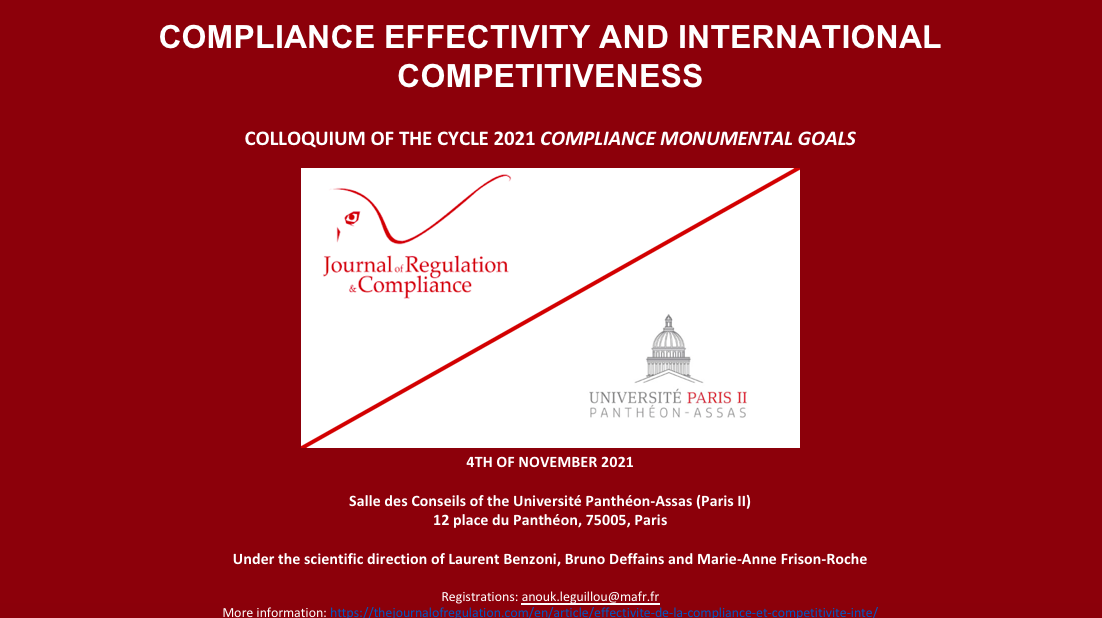
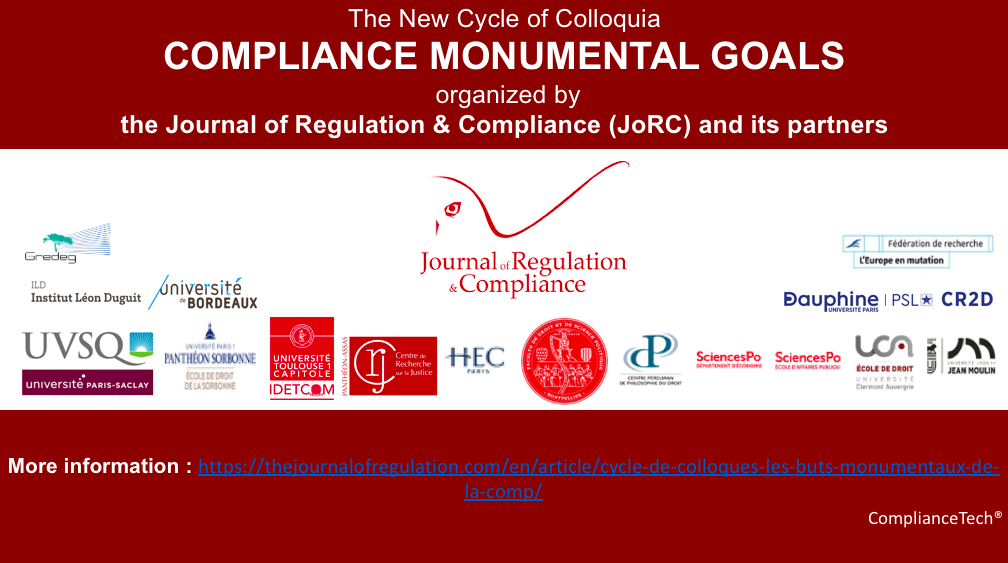
📅 The colloquium will take place in the Salle du Conseil (Panthéon-Assas University) on Thursday, November 4, 2021 from 1.30pm until 6.30pm.
🎥 The colloquium will be edited on video by the Journal of Regulation & Compliance.
Presentation of the topic :
Speakers:
🎤 Laurent Benzoni, professor of Economics at Panthéon-Assas University (Paris II), Tera Consultants
🎤Bruno Deffains, professor of Economics at Panthéon-Assas University (Paris II), director of the CRED
🎤 Marie-Anne Frison-Roche, Law professor at Sciences Po - Paris, director of the JoRC
🎤 Antoine Gaudemet, Law professor at Panthéon-Assas Université (Paris II), director of the Compliance Officer D.U.
🎤 Sabine Lochmann, CEO of Vigeo Eiris, Global Director of Moody’s ESG Solutions
🎤Frédéric Marty, economist, researcher at CNRS, member of GREDEG Côte d'Azur University
🎤 Stanislas Pottier, senior advisor to the General Management, Amundi
🎤 Jean-Christophe Roda, Law professor at Lyon 3 University
The different interventions will be then transformed into contributions in the books 📕 Les buts monumentaux de la Compliance and 📘 Compliance Monumental Goals which will be published in the Regulation & Compliance serie, jointly published by the JoRC and Dalloz for the French edition and by JoRC and Bruylant for the book in English.
Read a detailed presentation of the colloquium below:
Oct. 14, 2021
Events : JoRC
This scientific event is placed under the scientific responsibility of Marie-Anne Frison-Roche and Arnaud van Waeyenberge. It is organized by the Journal of Regulation & Compliance (JoRC) and by the Centre Perelman of Brussels University.
This event is part of the 2021 colloquia cycle around the general theme of Compliance Jurisdictionalisation.
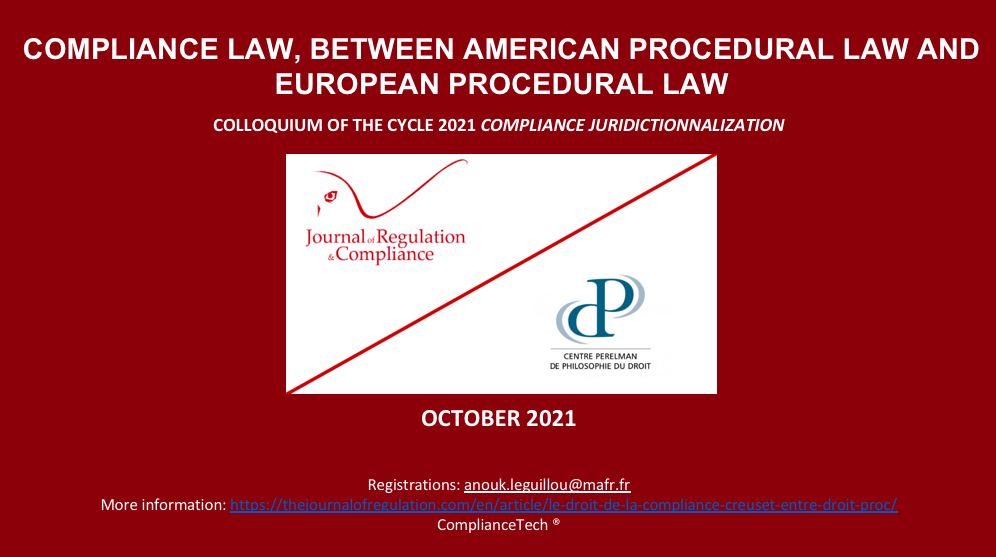
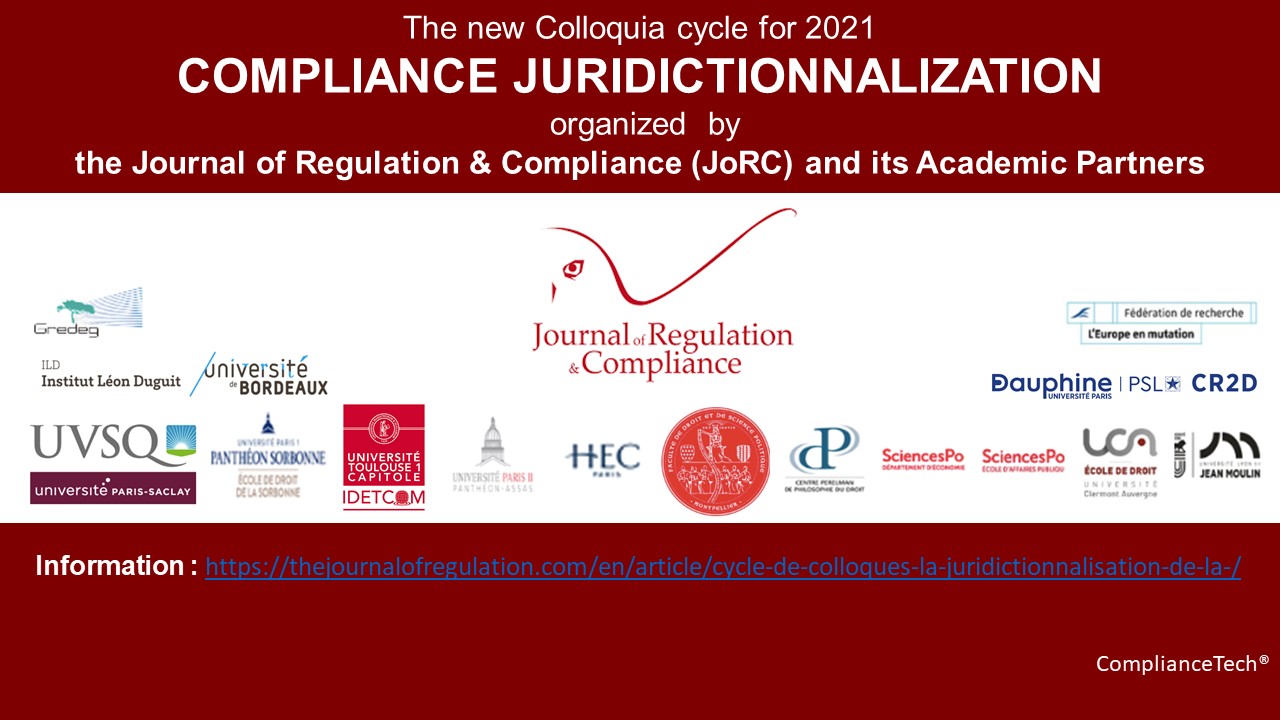
The different interventions will be then transformed into contributions in the books La juridictionnalisation de la Compliance and Compliance Juridictionnalization which will be published in the Regulation & Compliance serie, jointly published by the JoRC and Dalloz for the book in French and by JoRC and Bruylant for the book in English.
This colloquium will take place in Brussels in October 2021.
Presentation of the theme:
Notably will speak:
- Marie-Anne Frison-Roche, professor at Sciences Po - Paris
- Arnaud van Waeyenberge, professor at HEC Paris and researcher at Centre Perelman
Read a detailed presentation of the colloquium below:
Sept. 23, 2021
Events : JoRC
►This scientific event is placed under the scientific responsibility of Marie-Anne Frison-Roche, Juliette Morel Maroger and Sophie Schiller. It is organized by the Journal of Regulation & Compliance (JoRC) and by the Centre de recherche en Droit (CR2D) of Paris Dauphine-PSL University.
This event is part of the 2021 colloquia cycle around the general theme of Compliance Jurisdictionalisation.
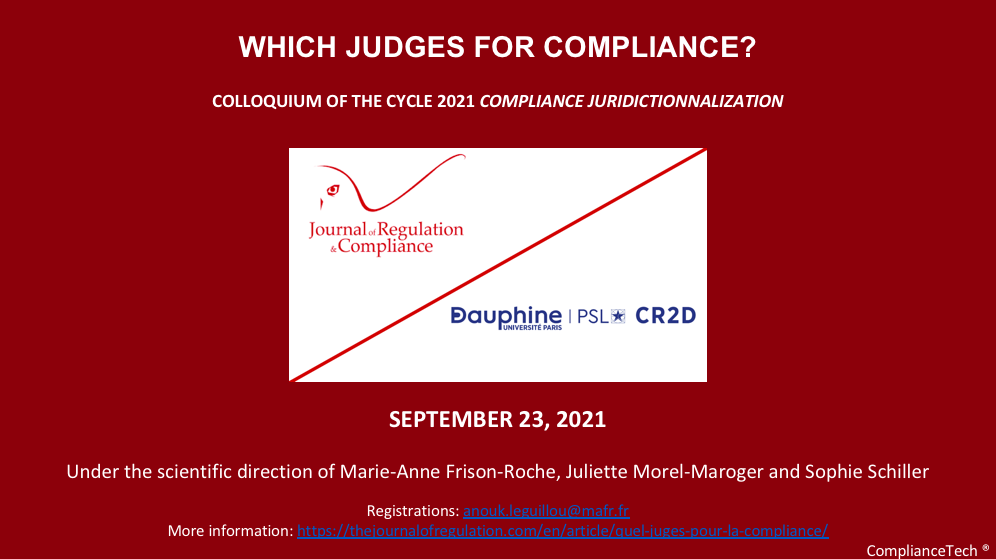

►The interventions will be then transformed into a chapter in the books: contributions in the 📕 La Juridictionnalisation de la Compliance , to be published the Regulation & Compliance series ries, jointly published by the Journal of Regulation & Compliance (JoR)C and Dalloz
📘Compliance Jurisdictionalisation, 
____
This colloquium will take place in Paris Dauphine-PSL University in September 2021.
Presentation of the topic :
Judges, regulatory and supervisory authorities, or even authorities specially instituted by Compliance Law, such as the Agence Française Anticorruption (French Anticorruption Agency), must implement it.
The colloquium aims initially to identify and discuss the procedural rules that they then specifically implement, in particular when the strong requirements of Compliance Law, efficiency and immediacy, new negotiation techniques and commitment, must be articulated with the traditional procedural requirements that remain.
The question arises in particular as to whether the rules of a fair trial should apply (or can they be similar in transactional procedures and in the context of judicial procedures, and how the control by judges operates during homologation) in transactional procedures, with more or less specific treatment of the evidence used.
Secondly, the colloquium considers the way in which the different judges assess the different constitutive standards of Compliance Law. These are often soft Law and depending on whether the judge is repressive, administrative, or European, his or her assessment will not be legally of the same scope or of the same nature, which together leads to an issue of articulation of method. Due to the breadth of the subject, certain sectors will be particularly examined, in particular the banking sector.
Thirdly, the way in which the judge himself or herself applies Compliance Law will be examined, in what appears to be a balance between pedagogy and sanction. It then appears to play a triple role, in that it ensures compliance with standards but also in that it must find effective solutions in a Law which is more in Ex Ante than in Ex Post and that it must support operators so that they act effectively, by mastering their obligations. The motivation for decisions then appears to be a primary issue.
Because this last phase concerns the even more direct relationship between the judge and the operators and stakeholders, this theme is intended to give rise to a presentation and a round table.
______________
Will speak notably:
- Claudie Boiteau, Professor at Paris Dauphine-PSL University, Member of the Centre de Recherche en Droit de l'Université Paris Dauphine-PSL (CR2D).
- Jean-François Bohnert, Financial National Prosecutor
- Olivier Catherine, Secretary General at Sonepar
- Nicolas Cayrol, Professor at Tours Law School and Director of the Institut d'Etudes Judiciaires François Grua
- Jean-Michel Darrois, Attorney, Darrois, Villey, Maillot, Brochier Law Firm
- Marie-Laure Denis, President of the CNIL
- Eric Dezeuze, Attorney, Bredin Prat Law Firm
- Marie-Anne Frison-Roche, Professor at Sciences Po (Paris), Director of the JoRC
- Juliette Morel-Maroger, Professor at Paris Dauphine-PSL University
- Sophie Scemla, Associate attorney, Gide Law Firm
- Sophie Schiller, Professor at Paris Dauphine-PSL University
Read a more detailed presentation below:
May 17, 2021
Events : JoRC
This scientific manifestation is placed under the scientific direction of Marie-Anne Frison-Roche, Pascale Idoux, Antoine Oumedjkane and Adrien Tehrani. It is organized by the Journal of Regulation & Compliance (JoRC) and by the Faculté de Droit et de Science Politique de l'Université de Montpellier (Centre de Recherches et d'Etudes Administratives de Montpellier and Centre du Droit de l'Entreprise).
📅 This manifestation is part of the cycle of colloquia organized in 2021 around the general topic of Compliance Monumental Goals.
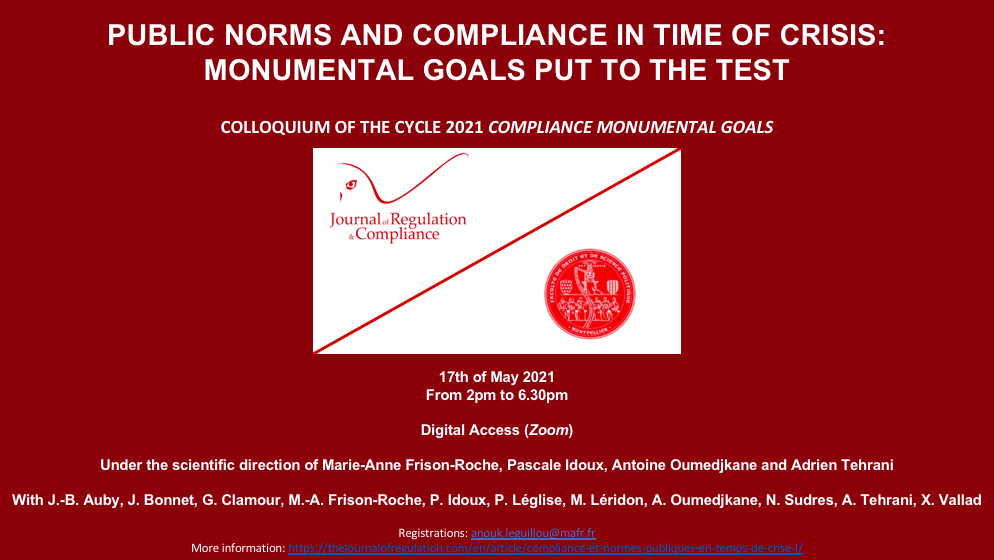

The interventions will give rise to the production of articles which will be part of
📕 Les bus monumentaux de la Compliance, 
📘Compliance Monumental Goals, 
This manifestation took place on Zoom on 17th of May 2021.
Registrations: anouk.leguillou@mafr.fr
Assistance to this event may be validated as part of the continuing education of lawyers.
In addition, scientific videos will be extracted and disseminated later.
Presentation of the topic: In the overall problematic of "Monumental goals", this conference retains a particular case: that of the crisis and the emergency situation that it generates.
First of all, in general, does the importance of public norms in the emergency context engendered by a crisis situation imply a marginalization of Compliance? Don't private actors also have their place in these circumstances, at the service of the "monumental goals" that the public authorities want to maintain, or even which appear specifically?
Secondly, more concretely, we have been living for many months in a health crisis. By taking it as a framework and, within it from particular cases, how public and private actors react, act, adjust? and how do the courts assess these movements?
Going from the most general to the most specific, this conference aims to identify criteria, limits, of what could be specific rules when the emergency of a crisis meets Compliance, and will examine specific situations.
Working method: The conference is therefore built on a general issue, which was the subject of a "working paper", written by Antoine Oumedjkane, Adrien Tehrani and Pascale Idoux, on which the speakers will have thought in advance and from which they are intended to study the question from their particular perspective.
The conference, which is essentially interactive, therefore begins with an outline of the main lines of this general work. It is followed by the examination of concrete practical cases.
They are as follows:
1️⃣ hydro-alcoholic gel, its manufacture, price, availability,
2️⃣ information and regulation on all media in Covid period
3️⃣ the use of the bicycle during the state of health emergency
A first conclusion, thematically limited, will relate to Revealed by the crisis situation, the place of private initiative in Compliance Law.
A second, more general, undoubtedly open-ended conclusion is drawn from this confrontation between general reflection and concrete cases which must be resolved in a particular crisis.
speakers:
🎤 Jean-Bernard Auby, Emeritus Professor of Sciences po (Paris)
🎤 Julien Bonnet, Professor at Montpellier University and member of the CERCOP
🎤 Guylain Clamour, Dean of Montpellier Law School
🎤 Marie-Anne Frison-Roche, agrégée des Facultés de droit, Professor of Regulation and Compliance Law at Sciences Po (Paris) and Director of the Journal of Regulation & Compliance (JoRC)
🎤 Pascale Idoux, Professor at Montpellier University
🎤 Pascale Léglise, adjointe au directeur des libertés publiques et des affaires juridiques (Deputy Director of Civil Liberties and Legal Affairs) of the Ministère de l'intérieur (Home Ministry)
🎤 Michèle Léridon, Member of the Conseil supérieur de l'audiovisuel (French Media Regulator), President of the working group Pluralisme, déontologie, supervision des plateformes en ligne (Pluralism, Deontology, Supervision of Online Platforms)
🎤 Antoine Oumedjkane, Researcher of the Centre de recherche et d'études administratives (Research and Administrative Studies Center) of Montpellier University
🎤 Nelly Sudres, Maître de conférences at Montpellier University and member of the Centre de Recherches et d'Etudes Administratives (Research and Administrative Studies Center) of Montpellier University
🎤 Adrien Tehrani, Professor at Montpellier University and member of the Centre du Droit de l'Entreprise (Company Law Center)
🎤Xavier Vallad, Group Legal Director, Intermarché
⤵️Read a more detailed presentation of the manifestation below:
March 31, 2021
Events : JoRC
This scientific manifestation is placed under the scientific responsibility of Marie-Anne Frison-Roche and Jean-Baptiste Vila. It is organized by the Journal of Regulation & Compliance (JoRC) and by Institut Léon Duguit of Bordeaux University.
This colloquium is part of the cycle of colloquium organized in 2021 around the general topic of Compliance monumental goals.
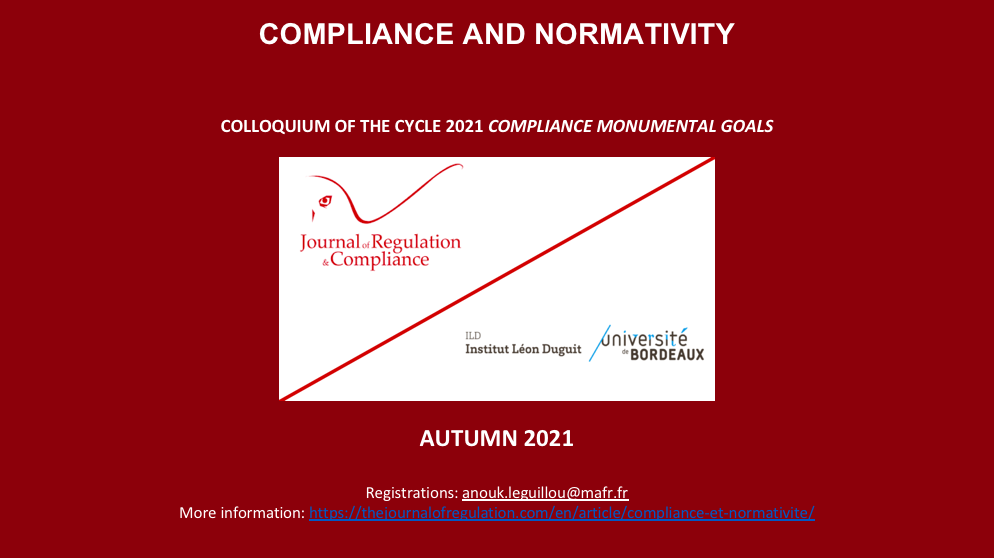

The works will be part of the two books, Les buts monumentaux de la Compliance et Compliance Monumental Goals, which will be published in the series Regulations & Compliance, coedited by the JoRC and Dalloz for the book in French and by JoRC and Bruylant for the book in English.
The manifestation will take place at Bordeaux University in the fall of 2021.
Presentation of the topic :
Will intervene especially:
- Marie-Anne Frison-Roche, professor at Sciences Po (Paris),
- Jean-Baptiste Vila, professor at Bordeaux University
Read a detailed presentation of the manifestation below:
April 2, 2020
Events : JoRC
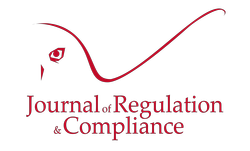
June 28, 2019
Breaking news

It is often observed, even theorized, even advised and touted, that Compliance is a mechanism by which public authorities internalize political (eg environmental) concerns in big companies, which accept them, in Ex Ante, because they are rather in agreement with these "monumental goals" (eg saving the planet) and that this shared virtue is beneficial to their reputation. It is observed that this could be the most successful way in new configurations, such as digital.
But, and the Compliance Mechanism has often been brought closer to the contractual mechanism, this is only relevant if both parties are willing to do so. This is technically true, for example for the Deferred Prosecution, which requires explicit consent. This is true in a more general sense that the company wants to choose itself how to structure its organization to achieve the goals politically pursued by the State. Conversely, the compliance mechanisms work if the State is willing to admit the economic logic of the global private players and / or, if there are possible breaches, not to pursue its investigations and close the file it has opened, at a price more or less high.
But just say No.
As in contractual matters, the first freedom is negative and depends on the ability to say No.
The State can do it. But the company can do it too.
And Daimler just said No.
___
Publicly, including through an article in the Wall Street Journal of June 28, 2019.
The company sets out in a warning to the market that it is the object of a requirement on the part of the German Motor Authority (Kraftfahrt-Bundesamt) of an allegation of fraud, by the installation of a software, aimed at misleading instruments for measuring emissions of greenhouse gases on cars using diesel.
It is therefore an environmental compliance mechanism that would have been intentionally countered.
On this allegation, the Regulator both warns the company of what it considers to be a fact, ie compliance fraud, and attaches it to an immediate measure, namely the removal of the circulation of 42,000 vehicles sold or proposed by Daimler with such a device.
And the firm answers : "No".
_____
Which is probably only beginning, since a No ends the dialogue of Ex Ante to project in the Ex Post sanction procedures, calls 6 observations:
- 1. No doubt Daimler, a German car manufacturing company, has it in mind in this allegation of fraud calculating pollution of its diesel cars what happened to his competitor Volkswagen: namely a multi-billion dollar fine, for lack of compliance in a similar hypothesis (so-called dieselgate). The strategic choice that is then made depends on education through the experience of the company, which benefits as such from a previous case that has had a very significant cost. Thus educated, the question is to measure the risk taken to refuse any cooperation, when the company can anticipate that it will still result in such an amount ....
- 2. In addition, we find the difficulty of the distinction of Ex Ante and Ex Post. Indeed, saying No will involve for the company a cost of confrontation with the Regulator, then the peripheral jurisdictions or review courts. But in Germany, the Government itself, concerning a bank threatened with compliance proceedings and almost summoned by the US regulator to pay "of its own free will" a transactional fine, felt that this was not normal, because it must be the judges who punish, after a contradictory procedure with due process and after established facts.
- 3. However, this is only an allegation, of probable assertions, of what legally allows to continue, but which does not allow to condemn. The confusion between the burden of proof, which presupposes the obligation to prove the facts before being able to sanction, and the burden of the allegation, which only supposes to articulate plausibility before being able to prosecute, is very damaging, particularly if we are committed to the principles of Repressive Law, such as the presumption of innocence and the due process. This distinction between these two probationary charges is at the heart of the probatory system in the Compliance Law. Because Compliance Law always looks for more efficiency, tends to go from the first to the second, to give the Regulator more power, since businesses are so powerful ....
- 4. But the first question then arises: what is the nature no so much of the future measure to be feared, namely a sanction that could be taken later, against Daimler, if the breach is proven, or which will not be applied to the firm if the breach is not established; but what is the nature of the measure immediately taken, namely the return of 42,000 vehicles?
- This may seem like an Ex Ante measurement. Indeed, the Compliance assumes non-polluting cars. The Regulator may have indications that these cars are polluting and that the manufacturer has not made the necessary arrangements for them to be less polluting (Compliance) or even organized so that this failure is not detected ( Compliance fraud).
- This allegation suggests that there is a risk that thiese cars will polluting. They must immediately be removed from circulation for the quality of the environment. Here and now. The question of sanctions will arise after that, having its procedural apparatus of guarantees for the company that will be pursued. But see the situation on the side of the company: having to withdraw 42,000 vehicles from the market is a great damage and what is often called in Repressive Law a "security measure" taken while the evidence is not yet met could deserve a requalification in sanction. Jurisprudence is both abundant and nuanced on this issue of qualification.
- 5. So to withdraw these cars, it is for the company to admit that it is guilty, to increase itself the punishment. And if at this game, taken from the "cost-benefit", as much for the company immediately assert to the market that this requirement of Regulation is unfounded in Law, that the alleged facts are not exacts, and that all this the judges will decide. It is sure at all whether these statements by the company are true or false, but before a Tribunal no one thinks they are true prima facie, they are only allegations.
- And before a Court, a Regulator appears to have to bear a burden of proof in so far as he has to defend the order he has issued, to prove the breach which he asserts exists, which justifies the exercise he made of his powers. The fact that he exercises his power for the general interest and impartially does not diminish this burden of proof.
- 6. By saying "No", Daimler wants to recover this classic Law, often set aside by Compliance Law, classic Law based on burden of proof, means of proof, and prohibition of punitive measures - except imminent and future imminente and very serious damages - before 'behavior could be sanctioned following a sanction procedure.
- Admittedly, one would be tempted to make an analogy with the current situation of Boeing whose aircraft are grounded by the Regulator in that he considers that they do not meet the conditions of safety, which the aircraft manufacturer denies , Ex Ante measurement that resembles the retraction measure of the market that constitutes the recall request of cars here operated.
- But the analogy does not work on two points. Firstly, flight activity is a regulated activity that can only be exercised with the Ex Ante authorization of several Regulators, which is not the case for offering to sell cars or to drive with. This is where Regulatory Law and Compliance Law, which often come together, here stand out.Secundly, the very possibility that planes of which it is not excluded that they are not sure is enough, as a precaution, to prohibit their shift. Here (about the cars and the measure of the pollution by them), it is not the safety of the person that is at stake, and probably not even the overall goal of the environment, but the fraud with respect to the obligation to obey Compliance. Why force the withdrawal of 42,000 vehicles? If not to punish? In an exemplary way, to remind in advance and all that it costs not to obey the Compliance? And there, the company says: "I want a judge".
______
June 23, 2019
Breaking news

The European Banking Union is based on supervision as much as on regulation: it concerns the operators as much as the structures of the sector, because the operators "hold" the sector.
This is why the "regulator - supervisor" holds the operators by the supervision and is close to them.
He meets them officially and in "soft law" relations. This is all the more necessary since the distinction between the Ex Ante and the Ex Post must be nuanced, in that its application is too rigid, in that it involves a long time (first of all the rules, then to apply them, then to notice a gap between rules and behaviors, then to repair it) is not appropriate if the system aims at the prevention of systemic crises, whose source is inside the operators.
This is why the body in charge of solving the difficulties of the systemic banks for the salvation of the systeme meets the banking sector itself, to ensure that they are permanently "resolvable", so that the hypothesis of their resolution never arises. This is the challenge of this system: that it is always ready, for never be applying.
____
In the European Banking Union, the Single Resolution Board (SRB) is in charge of "resolve" the difficulties of European systemic banks in difficulty. It is the public body of the second pillar of the Banking Union. The first pillar is the prevention of these difficulties and the third is the guarantee of deposits. The resolution is therefore more like an Ex Post mechanism.
But in this continuum through these three pillars between the Ex Ante and the Ex Post, the SRB does not wait passively - as would a traditional judge do - that the file of the troubled bank reaches it. Like a supervisor - which brings it closer to the first public in the system (Single Supervisory Board -SSB), which supervises all the banks, it is in direct contact with all the banks, and it approaches the hypothesis of a bank in trouble by a systemic perspective: it is therefore to the entire banking system that the SRB addresses itself.
As such, it organizes meetings, where he is located: in Brussels.
To resolve in Ex Post the difficulties of a bank, it has to present a quality (a little known concept in Bankruptcy Law): "resolvability". How build it? Who build it ? In its very design and in its application, bank by bank.
For the resolution body vis-à-vis all players in the banking and financial sector, it's clear: "Working together" is crucial in building resolvability ".
In the projection that is made, it is affirmed that there can be a successful resolution only if the operator in difficulty is not deprived of access to what makes to stay it alive, that is to say the banking and financial system itself, and more specifically the "Financial Market Infrastructures", for example payment services.
Does the Single Resolution Board expect spontaneous commitments from the FMIs for such a "right of access"? In this case, as the Single Resolution Board says, this right of access corresponds to "critical functions" for a bank, the resolution situation can not justify the closure of the service.
By nature, these crucial operators are entities that report to regulators who oversee them. Who enforces - and immediately - this right of access? When one can think that it is everyone, it risks being nobody .... That is why the resolution body, relaying in this a concern of the Financial Stability Board, underlines that it is necessary to articulate the supervisors, regulators and "resolvers" between them.
_____
To read this program, since it is a proposed program of work for the banking sector, four observations can be made:
1. We are moving more and more towards a general "intermaillage" (which will perhaps replace the absence of a global State, but it is an similar nature because it is always to public authorities that it refers and not to self-regulation);
2. But as there is no political authority to keep these guardians, the entities that articulate all these various public structures, with different functions, located in different countries, acting according to different temporalities, these are the companies themselves that internalize the concern that animates those who built the system: here the prevention of systemic risk. This is the definition of Compliance, which brings back to companies, here more clearly those those which manage the Market Infrastructures, the obligations of Compliance (here the management of systemic risk through the obligation of giving access).
3. Even without a single systemic guard, there is always a recourse. That will be the judge. There are already many, there will probably be more in a system of this type, more and more complex, the articulation of disputes is sometimes called "dialogue". And it is undoubtedly "decisions of principle" that will set the principles common to all of these particular organisms.
4. We then see the emergence of Ex Ante mechanisms for the solidity of the systems, and the solidity of the players in the systems, and then the Ex Post resolution of the difficulties of the actors according to access to the solidity of the infrastructures of these systems, which ultimately depend on judges (throughout the West) facing areas where all of this depends much less on the judge: the rest of the world.
____
June 21, 2019
Breaking news

Dec. 13, 2018
Events : JoRC
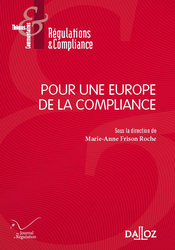
Nov. 15, 2018
Events : JoRC

Oct. 4, 2018
Events : JoRC

Sept. 7, 2018
Breaking news
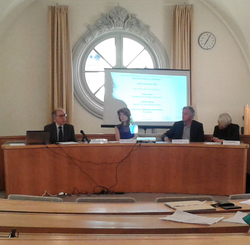
Sept. 6, 2018
Events : JoRC

May 31, 2018
Breaking news

In the series of conferences organized by the Journal of Regulation & Compliance (JoRC on the subject of the Europe of Compliance, Pierre Vimont reacted in a "first discussion" at the conference that Xavier Musca, Deputy Chief Executive Officer of the Crédit Agricole Group has just done about the way in which European companies of global dimension can do in a European perspective, integrating the new phenomenon of Compliance.
Based entirely on the conference that had just ended, Pierre Vimont emphasized how Europe can develop this perspective of Compliance.
Read the restitution of the Pierre Vimont's speech below.
May 30, 2018
Events : JoRC

April 14, 2018
Breaking news
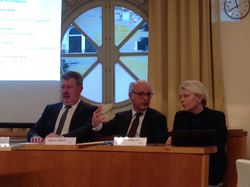
March 20, 2018
Events : JoRC

March 3, 2018
Events : JoRC
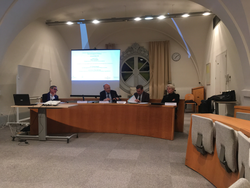
Among all the things that were important to remember, one of the things that struck me most in the extraordinary conference of the President of the Court of Justice of the European Union Koen Lenaerts on "Europe of the Compliance "held on March 2, 2018 was his ability to make" live Europe ". Not only to make it understand but also to make it "live". Here is the challenge: that compliance is not an accumulation of processes without reason and without flesh, but a living whole taking its meaning into consideration of the human being, a person whose judge is concerned.
On 2 March 2018, Koen Lenaerts therefore came to an amphitheater at the University Panthéon-Assas (Paris 2) to inaugurate the series of conferences organized by the Journal of Regulation & Compliance (JoRC), a cycle that has the general title: Pour une Europe de la Compliance (For the Europe of Compliance). The School of Public Affairs of Sciences Po, the Department of Economics of Sciences Po, the Ecole doctorale de droit privé (Doctoral School of Private Law) at the Université Panthéon-Assas- Paris 2 (Panthéon-Assas University - Paris 2) and the School of Law of the University Panthéon-Sorbonne (Paris I), are associated with this cycle. Many personalities will take the floor.
Presented by Professor Thierry Bonneau, the conference made by President Koen Lenaerts was extremely rich and solid, perfectly constructed. Everyone had known the quality of the conference to be delivered by the President of the CJEU. The content of his demonstration will be found in the article he will give for the book that will be published in the Régulations & Compliance Series edited by Marie-Anne Frison-Roche at Éditions Dalloz. And the reader will find all the strength of this demonstration. This is necessary to venture into this area of "Compliance" : Koen Lenaerts recalled that we were still looking for the definition and a French term that would do justice to a satisfactory definition!footnote-90. This question was echoed by Antoine Garapon in his discussion.
Embodying the firmness that must be shown when words are uncertain, President Koen Lenaerts emphasized that the European Union is based on "Rule of Law". This means that the behaviors must respect Law. For that, - and that is why it is necessary to take in the literal sense the English expression "to comply with", the enterprise must not be passive but to make sure that its behavior is actually respectful of legal prescriptions. In this, there is a general paradigm shift, which inverses the relation betwenn the operator and the rules, from the Ex Post to the Ex Ante!footnote-89 as the entreprise has to be itself active to secure the effectiveness of the rule of Law. This internalization of the rule by the company develops both a procedural culture and a behavioral culture, in which companies can express an ethical dimension and build a "Trust Pact" !footnote-88 with states and public authorities. This change has been brought about by globalization, since states no longer have the means to impose ethical norms of behavior on businesses through the Ex Post intervention of their jurisdiction, but States like companies are gaining the benefit of this internalisation of rules in compagnies because the Compliance is inseparable from the accountability by which the company is compelled to justify that it actually tends to achieve the overall goals assigned by the public authority.
Thus, after exposing the general movement by which Europe opened up to this upheaval, President Koen Lenaerts took on three technical dimensions crossed by this new conception. The first is the Financial Markets Law. The second is Competition Law, about which the President has notably developed the Court's reflections on whether the adoption of a compliance program by an enterprise found to have violated Competition Law, in particular by "negligence" is neutral, or constitutes a mitigating circumstance or constitutes an aggravating circumstance. This question was taken up after the presentation in the discussion with the room. The third is that of personal data. Taking again as in a waltz with three times his remarks, the president of the Court of Justice found that the compliance, whereas it consists in transforming the Ex Post into Ex Ante becomes juridicalised and in this the Court of justice holds its not only in Europe but also in relation to the world, without however ever forgetting that it is the States that are drawing up the rules that are the foundation of Europe.
We will find in the article that will be published all these precious elements and no doubt that the elegance of the pen will be equal to that of speech.
But, written exercise requires, the reader will not find what we had the chance to attend: the story of two cases by the one I would prefer to name the "Professor Koen Lenaerts".
Two famous cases, which we teachers, comment and remind in our courses, that students learn and recite, quote in their copies. But never that way.
The first case is the Schrerms case, where the court said that Facebook could not transfer this person's personal data to the United States since he was opposed to it. To make it clear, the President revived it through the litigant, who was a student and for this reason he spoke directly to the students present in the amphitheater. He pointed out that the plaintiff at the origin of the case was a law student, like them. He detailed his situation in Austria, making some quotes in perfect German, pointing out that this student was now at the doctoral stage, inviting students to be brave, as he was. At each episode of the story, the speaker told the students, making some detours on his own student life because finally we were all in family ... Alma Mater. But his hands were telling the story even more: they were thrown themselves into the story, they brewed the space, it seemed as if they themselves were no more grandiloquent than the speaker but found their place exactly , in a magisterial position. Yes, here is a president in front of which companies have a hard time hiding the truth, a president with such firm hands and whose torso does not move but turns to the left and right to talk to everyone.
The second story was even more beautiful. The Google Spain case, I know it. I even know it by heart. I read it, commented on it, cited it a lot of times ... But all of a sudden that's what happened to a small Spanish merchant: President Koen Lenaerts told us his story, and I rediscovered the case. A small Spanish shopkeeper, whose name the speaker uttered in perfect Spanish, obtained from the Court of Justice that his "right to be forgotten" was recognized. President underlined the apparent paradox of his insistence for the appearance of his surname in the judgment by which this person had thus obtained the erasing of his surname! Yes, I did not notice ... Why did he ask for the mention of his name in the right to have his name deleted? Because it's a matter of honor. This is what the speaker insisted: do not joke with honor. And if you do, even Google will lose.
The merchant had been subject to a forced property sale procedure because of financial difficulty, which spanish newspapers had echoed. His honor was been trampled. Then, by a happy return of fortune, he had recovered his property, his prosperity, his reputation. But from that, the press had not talked about it. Some lines in a newspaper of legal announcements, but that it is nothing for the human soul. That's why he wanted these mechanical digital links to disappear, which always and for all end up with articles presenting him as a wretch without ever ending up with articles presenting him as a prosperous merchant (because of the non-existence of these second articles).
The speaker emphasized this dimension very much. And we know that the General Regulations that will come into force in May 2018 on personal data, which intrigues so much the Americans, draws in the judgment Google Spain its main solution in the matter: this "right to be forgotten" , subjective right so strange.
He emphasized this dimension very much. And we know that the General Regulations that will come into force in May 2018 on personal data, which intrigues so much the Americans, draws in the judgment Google Spain its main solution in the matter: this "right to be forgotten" , subjective right so strange.
Listening to President Koen Lenaerts, how not to think of Carbonnier? to his articles of it, especially on sociological rule : "small causes, great effects"?
From this conference, it will remain a great article, but as in the theater, where the ephemeral is part of the beauty of this art, what were these two stories, told by the one who knew how to listen when it was necessary to decide the two cases, stories told with the two firm hands that danced inviting students to enter this round, even as the President of the Court of Justice had to leave immediately to Luxembourg to hold such heavy obligations, yes it was simply beautiful .
Oct. 5, 2016
Events : JoRC

Sept. 14, 2016
Releases : I. Isolated Articles
Ce que l'arrêt Exane du Conseil d'Etat du 3 février 2016 nous apprend sur l'obligation de conformité

July 4, 2016
Breaking news

Speaking to the press is a way for the Regulator to reach everyone, including policymakers, European institutions, and fellow Regulators who also seek to compete for space in the digital area.
As he reported: "Nous arrivons aujourd’hui, avec l'irruption du numérique, à un acte 2 de la régulation. Il y a 20 ans, on est passé du modèle PTT où l’Etat produisait le service public, au modèle d’État-régulateur qui a permis l’ouverture à la concurrence. Ce modèle vise à une bonne organisation du marché avec des outils de pilotage efficaces, mais parfois très intrusifs : les licences mobiles, qui sont des contrats assortis de sanctions administratives en cas de non-respect des obligations, ou le dégroupage, qui est une intervention sur la propriété privée… Aujourd’hui il nous faut franchir une étape nouvelle et nous projeter dans la suite, repenser nos outils pour permettre, en complément, une régulation plus focalisée, plus humble et plus agile". We can translate this passage as it follows : “As of today, considering the onset of digital, we are getting to a second phase for Regulation. Over the past 20 years, we went from the ‘PTT model’, where the State provided for public service, to a new Regulatory State model that enabled competition to thrive. This model aims for good market organization with effective management tools, which may be sometimes very intrusive: e.g., mobile licenses, which are agreements that include administrative penalties in the event of failure to comply with its provisions, or unbundled access, which relates to a State intervention on private ownership… Today, we need to take it another step further and plan for the future, reconsider our tools to allow for a Regulation that would be better focused, humbler and nimbler”.
Whatever “Phase 1” was would thus be already outpaced. Farewell stringent public service, so long market openings to competition. Such an understanding of Regulation was certainly consistent with the idea that Regulation was only meant to be temporary, namely considering the everlasting protection of personal data by the dedicated supervisory authority (Commission Nationale Informatique et Libertés, CNIL)…
We would then need to implement “Phase 2” and, as Sébastien Soriano advises, to “Regulate by the multitude”, which is "a concept that includes consumers, but also users, observers, and the civil society as a whole. The key question is how to use the power of information to get the greatest possible leverage on the market while relying on the multitude. The answer is clear: Regulation by data" ("La multitude, ce sont les utilisateurs, les observateurs, la société civile. Cela inclut les consommateurs, mais pas uniquement. Et la question centrale, c’est comment utiliser le pouvoir de l’information pour avoir un maximum d'effet de levier sur le marché et grâce à la multitude. La réponse, c’est la régulation par la data.").
Like all the others, the Telecom Regulator introduces himself as a sort of ‘natural’ Regulator for digital activities, as he relies on the key notion that is information. In doing so, he is seeking allies that are just as natural as he is— that is to say, consumers. Consumers fall indeed into the scope of the Regulator insofar as they provide him with the information he needs to Regulate the digital sector and space.
The Regulator thus does not define himself anymore as the one that protects consumers against the market, but as the one that binds the two together, transforming the complaint into a civic act: “There’s a problem. As a consumer, I am alerting you as a Regulator who has the means to regulate market failures and whom I shall let operate”.
In such a statement, the ARCEP not only becomes the ‘natural’ digital Regulator, but it also become the one that operates on the grounds of information brought by the web-user, who is protected by and who somehow benefits in return from the action of the Regulator.
Two concluding thoughts:
- What a nimble reasoning indeed from the Regulator, who had initially been created to be the ‘container Regulator’, and who is now becoming, since Phase 2 is on its way, a kind of ‘overall’ Regulator that regulates both the container and the content.
- This is a salient example that rationales and frameworks that were developed by the Banking and Financial Regulation are modelling Regulation in general: see whistleblowers, information, obsolescence of the ‘public service’.
June 16, 2016
Thesaurus : Doctrine
June 15, 2016
Thesaurus : Doctrine
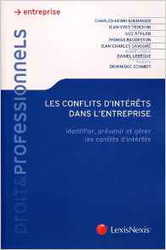

June 14, 2016
Breaking news
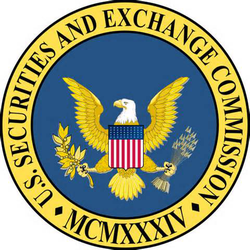
On 9 June, the SEC made an announcement on its website.
- The Regulator itself issued the amount of the award to a whistleblower for having providing it with information. Why is that? One would usually take a lower profile when awarding this much money ($17m) to an informer… Conversely, the Regulator immediately and publicly announced it in a press release, which pretty looked like a tender offer for further denunciations. It even included a link for everyone to access the whistleblower program—which is easily funded, since the awards are charged on the fines imposed on the convicted operators thanks to the information given.
- The reason for this is that information from whistleblowers is not merely indicative, nor a second-best option; it is central to Regulation, since it leads the Regulator to get information people within the system (i.e., insiders) deliberately chooses to ‘blow’ (in fact, not only do informers blow the whistle—they often immediately provide the Regulator with substantial information).
- The press release includes justifications for the Regulator’s behaviour, as the SEC openly considers that rewarding whistleblowers is the most efficient way for the Regulator to open or to resolve investigations. The Director of the SEC’s Division of Enforcement stated indeed that “company insiders are uniquely positioned to protect investors and blow the whistle on a company’s wrongdoing by providing key information to the SEC so we can investigate the full extent of the violations”.
- This highlights the ambivalence of insiders. Accordingly, they need to be ‘inside’ the system to be ‘knowledgeable’ and, consequently, obtain privileged information. On the one hand, should they use this information for themselves, then they would face prosecution for market abuse; on the other hand, however, if they use it to stir up the Regulator and shift its attention towards the whistle they’re blowing, then they may earn just as much money, if not more, than if they had behaved in a way that would have led them to prison.
The stage is thus set for the "business of virtue" to thrive.
